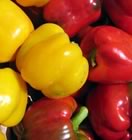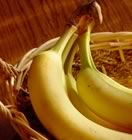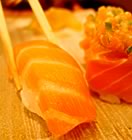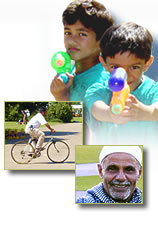|
FOOD & NUTRITION
 We have heard the old adage many times before ‘You
are what you eat’, it is an important statement that we often
brush aside. The energy and nutrition provided by the food in our
diets is the fuel
that allows our bodies to work, move, think and respond. For our bodies
to perform at optimum levels throughout our lives, we must ensure
a balanced and wholesome intake of nutrients. Remember, a controlled
healthy
diet, is an essential part of any exercise programme. For the formula
to a healthy mind, spirit and body, diet and exercise are both vital
components. Check whether you have a healthy weight on our BMI
Calculator. We have heard the old adage many times before ‘You
are what you eat’, it is an important statement that we often
brush aside. The energy and nutrition provided by the food in our
diets is the fuel
that allows our bodies to work, move, think and respond. For our bodies
to perform at optimum levels throughout our lives, we must ensure
a balanced and wholesome intake of nutrients. Remember, a controlled
healthy
diet, is an essential part of any exercise programme. For the formula
to a healthy mind, spirit and body, diet and exercise are both vital
components. Check whether you have a healthy weight on our BMI
Calculator.
The scientific study of the nutrition/health relationship is an on
going process. However, many important discoveries have signalled
the contribution
of diet towards helping prevent life threatening illnesses. The correct
amount and mix of food can reduce the risk of developing heart disease,
bowel disorders, osteoporosis, cancer and becoming overweight.
Furthermore,
it can strengthen your defences against common illnesses such as cough,
colds, flu and migraine. As with exercise, the everyday benefits of
a sensible diet include a personal feel good factor, a better physique,
more energy and healthier looking hair and skin but to name a few.
 When discussing nutrients, it is essential for us to understand the
importance of balance and variety in our diets. We are blessed in
the fact that our bodies have an amazing ability to compensate for
deficient
and inadequate dietary intake. Nevertheless, a consistently poor diet
and excessive amount of any one nutrient, will sooner or later take
its toll. Let us take a more detailed look at the different nutrients
and processes that work together to facilitate a healthy diet. When discussing nutrients, it is essential for us to understand the
importance of balance and variety in our diets. We are blessed in
the fact that our bodies have an amazing ability to compensate for
deficient
and inadequate dietary intake. Nevertheless, a consistently poor diet
and excessive amount of any one nutrient, will sooner or later take
its toll. Let us take a more detailed look at the different nutrients
and processes that work together to facilitate a healthy diet.
Proteins
Carbohydrates
Fibre
Fats
Vitamins & Minerals
Water
Energy
 It is quite clear that we need to implement some drastic
changes in our activity and eating habits. We sometimes take food
for granted and abuse the abundant supply of food whilst trying
to satisfy our desires for good taste at the expense of nutrition
and
health. Convenience foods like burgers, chips and fried chicken,
have become the unfortunate substitute for a healthy balanced diet.
There
is no miracle food or diet that will give us good health. In practice,
this requires a sustained effort and complete change in attitude
towards healthy eating and living. It is quite clear that we need to implement some drastic
changes in our activity and eating habits. We sometimes take food
for granted and abuse the abundant supply of food whilst trying
to satisfy our desires for good taste at the expense of nutrition
and
health. Convenience foods like burgers, chips and fried chicken,
have become the unfortunate substitute for a healthy balanced diet.
There
is no miracle food or diet that will give us good health. In practice,
this requires a sustained effort and complete change in attitude
towards healthy eating and living.
We need to begin by ignoring the desires of the mind
and listening to the needs of the body. Try and avoid big, sudden
changes in
habits like crash diets, ‘Fad’ diets or high protein
diets which can be short term cures and may leave an individual
feeling hungry,
unwell, stressed and de-motivated. Any specific weight-loss programme
needs to be practical and gradual. It will require enthusiasm,
discipline and above all sacrifice. Set some basic, realistic
goals for change
in eating habits and some form of physical exercise, even if it
is just walking. Work on these small but significant changes in
your
diet and lifestyle, with the aim of striking a satisfactory balance
between what you eat and exercise. As discussed under energy,
our bodies store excess calories in the form of fat in the adipose
layer
under the skin. Therefore to reduce weight the level of calories
coming in via eating need to be lower than calories going out
via activity.
This balance needs to be struck consistently to maintain a good weight.
Your diet should be based on the following basics:
| |
 |
 |
Purpose of travelEat at least
five portions of fruit and vegetables a day |
 |
Eat food high in starch like,
bread, rice, pasta and potatoes |
 |
Select leaner cuts of meat, remove
the skin from chicken and cook fish more often. |
 |
Keep an eye on daily calories
and reduce the level of salt consumed. |
 |
Only use low fat varieties of
food such as dairy products, fish and meat. |
 |
Try and use spreading fats and
oils as little as possible and if you do, then opt for low fat
spreads and olive/sunflower oil. |
 |
Change your cooking methods,
choose steaming, grilling, baking or boiling. |
 |
Eat at regular intervals, eat
slowly and chew food properly. Do not over eat and feel bloated,
leave room for water and air! |
 |
Avoid eating late at night and
minimise intake of fatty and sugary chocolates, mithai, bakhlava,
crisps, biscuits etc. |
Once you have set your goals, make small but continuous
changes towards achieving them. Eating healthy with sensible exercise
can be both
fun and pleasurable. We truly have a huge selection of healthy
and nutritious edibles to choose from. Stay focused and dedicated to
your new lifestyle and you will undoubtedly feel and see the difference
in yourself. As we know, we are blessed with just one body, so
lets
look after it.

Photo Credit
Sushi - Atena
kaspar
|



![]()
 We have heard the old adage many times before ‘You
are what you eat’, it is an important statement that we often
brush aside. The energy and nutrition provided by the food in our
diets is the fuel
that allows our bodies to work, move, think and respond. For our bodies
to perform at optimum levels throughout our lives, we must ensure
a balanced and wholesome intake of nutrients. Remember, a controlled
healthy
diet, is an essential part of any exercise programme. For the formula
to a healthy mind, spirit and body, diet and exercise are both vital
components. Check whether you have a healthy weight on our
We have heard the old adage many times before ‘You
are what you eat’, it is an important statement that we often
brush aside. The energy and nutrition provided by the food in our
diets is the fuel
that allows our bodies to work, move, think and respond. For our bodies
to perform at optimum levels throughout our lives, we must ensure
a balanced and wholesome intake of nutrients. Remember, a controlled
healthy
diet, is an essential part of any exercise programme. For the formula
to a healthy mind, spirit and body, diet and exercise are both vital
components. Check whether you have a healthy weight on our  When discussing nutrients, it is essential for us to understand the
importance of balance and variety in our diets. We are blessed in
the fact that our bodies have an amazing ability to compensate for
deficient
and inadequate dietary intake. Nevertheless, a consistently poor diet
and excessive amount of any one nutrient, will sooner or later take
its toll. Let us take a more detailed look at the different nutrients
and processes that work together to facilitate a healthy diet.
When discussing nutrients, it is essential for us to understand the
importance of balance and variety in our diets. We are blessed in
the fact that our bodies have an amazing ability to compensate for
deficient
and inadequate dietary intake. Nevertheless, a consistently poor diet
and excessive amount of any one nutrient, will sooner or later take
its toll. Let us take a more detailed look at the different nutrients
and processes that work together to facilitate a healthy diet.  It is quite clear that we need to implement some drastic
changes in our activity and eating habits. We sometimes take food
for granted and abuse the abundant supply of food whilst trying
to satisfy our desires for good taste at the expense of nutrition
and
health. Convenience foods like burgers, chips and fried chicken,
have become the unfortunate substitute for a healthy balanced diet.
There
is no miracle food or diet that will give us good health. In practice,
this requires a sustained effort and complete change in attitude
towards healthy eating and living.
It is quite clear that we need to implement some drastic
changes in our activity and eating habits. We sometimes take food
for granted and abuse the abundant supply of food whilst trying
to satisfy our desires for good taste at the expense of nutrition
and
health. Convenience foods like burgers, chips and fried chicken,
have become the unfortunate substitute for a healthy balanced diet.
There
is no miracle food or diet that will give us good health. In practice,
this requires a sustained effort and complete change in attitude
towards healthy eating and living.